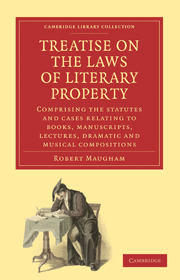 Treatise on the Laws of Literary Property
Treatise on the Laws of Literary Property Book contents
- Frontmatter
- LAWS OF LITERARY PROPERTY
- ANALYTICAL TABLE OF CONTENTS
- BOOK I HISTORICAL VIEW OF THE LAW
- BOOK II THE PRESENT STATE OF THE LAW
- BOOK III DISQUISITIONS ON THE PRINCIPLES OF THE LAWS AND THEIR EFFECT ON LITERATURE
- FIRST PART. OF THE LIMITATION OF COPYRIGHT TO TWENTY-EIGHT YEARS
- SECOND PART. OF THE LIBRARY TAX OF ELEVEN COPIES OF EVERY BOOK
- NOTES, COMPRISING AUTHORITIES REGARDING THE LIMITATION OF COPYRIGHT, AND THE LIBRARY TAX
- TABLE OF CASES CITED OR REFERRED TO, AND WORKS OR SUBJECTS LITIGATED
- INDEX
- ERRATA
FIRST PART. OF THE LIMITATION OF COPYRIGHT TO TWENTY-EIGHT YEARS
Published online by Cambridge University Press: 05 August 2011
- Frontmatter
- LAWS OF LITERARY PROPERTY
- ANALYTICAL TABLE OF CONTENTS
- BOOK I HISTORICAL VIEW OF THE LAW
- BOOK II THE PRESENT STATE OF THE LAW
- BOOK III DISQUISITIONS ON THE PRINCIPLES OF THE LAWS AND THEIR EFFECT ON LITERATURE
- FIRST PART. OF THE LIMITATION OF COPYRIGHT TO TWENTY-EIGHT YEARS
- SECOND PART. OF THE LIBRARY TAX OF ELEVEN COPIES OF EVERY BOOK
- NOTES, COMPRISING AUTHORITIES REGARDING THE LIMITATION OF COPYRIGHT, AND THE LIBRARY TAX
- TABLE OF CASES CITED OR REFERRED TO, AND WORKS OR SUBJECTS LITIGATED
- INDEX
- ERRATA
Summary
CHAP. I.—THE OBJECTIONS TO A PERPETUITY IN COPYRIGHT CONSIDERED
I. It has been objected that, although the invention and labor, by which literary compositions are produced, entitle the author to the exclusive use of his manuscript, the right cannot be extended to IDEAS, because they are not objects of property.
In the commencement of our historical view, we have considered the nature and foundation of the rights of literary property, and shewn that it was equally entitled with any other production whether depending upon occupancy or labor, to the full protection of the laws—that if it came not within the literal definition of “property,” as laid down of old, it was assuredly within its spirit—that the general interests of society, as well as the comprehensive principles of justice, required the protection of copyright, and to exclude it would be a violation of the boasted maxim of the English Law, that redress is provided for every injury.
In further reply to this objection, “that there can be no property in ideas,” it must be observed, that an author does not claim a copyright in the subject on which he has written, but in the composition which he has produced on that subject. In the cases which have been decided regarding the piracy of copyright, it is repeatedly laid down, that “the subject” of literary compositions is open to all writers ; but that no one must seize and appropriate to himself the labor bestowed by another.
- Type
- Chapter
- Information
- Treatise on the Laws of Literary PropertyComprising the Statutes and Cases Relating to Books, Manuscripts, Lectures, Dramatic and Musical Compositions, pp. 181 - 195Publisher: Cambridge University PressPrint publication year: 2010First published in: 1828


